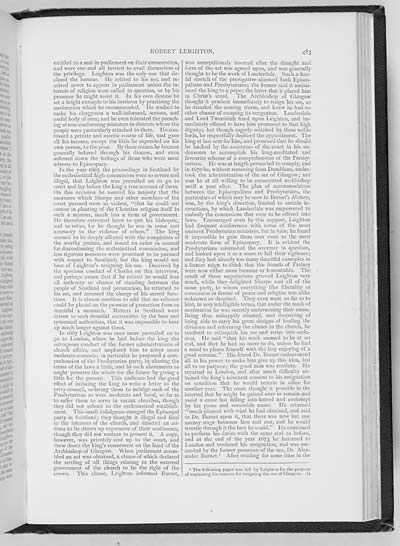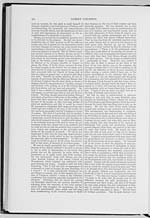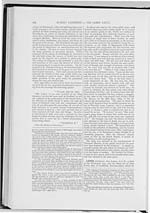483
entitled to a seat in parliament on their consecration,
and were one and all invited to avail themselves of
the privilege. Leighton was the only one that de-
clined the honour. He retired to his see, and re-
solved never to appear in parliament unless the in-
terests of religion were called in question, or by his
presence he might assist it. In his own diocese he
set a bright example to his brethren by practising the
moderation which he recommended. He studied to
make his clergymen a well-informed, serious, and
useful body of men; and he even tolerated the preach-
ing of non-conforming ministers in districts where the
people were particularly attached to them. He con-
tinued a private and ascetic course of life, and gave
all his income, except the little he expended on his
own person, to the poor. By these means he became
generally beloved through his diocese, and even
softened down the feelings of those who were most
adverse to Episcopacy.
In the year 1665 the proceedings in Scotland by
the ecclesiastical high-commission were so severe and
illegal, that Leighton was prevailed on to go to
court and lay before the king a true account of them.
On this occasion he assured his majesty that the
measures which Sharpe and other members of the
court pursued were so violent, "that he could not
concur in planting of the Christian religion itself in
such a manner, much less a form of government.
He therefore entreated leave to quit his bishopric,
and to retire, for he thought he was in some s6rt
accessory to the violence of others." The king
seemed to be deeply affected with the complaints of
the worthy prelate, and issued an order in council
for discontinuing the ecclesiastical commission, and
less rigorous measures were promised to be pursued
with respect to Scotland; but the king would not
hear of Leighton's resigning his see. Deceived by
the specious conduct of Charles on this interview,
and perhaps aware that if he retired he would lose
all authority or chance of standing .between the
people of Scotland and persecution, he returned to
his see, and resumed the charge of his sacred func-
tions. It is almost needless to add that no reliance
could be placed on the promise of protection from so
deceitful a monarch. Matters in Scotland were
driven to such dreadful extremities by the base and
tyrannical authorities, that it was impossible to bear
up much longer against them.
In 1667 Leighton was once more prevailed on to
go to London, where he laid before the king the
outrageous conduct of the former administrations of
church affairs, and implored him to adopt more
moderate counsels; in particular he proposed a com-
prehension of the Presbyterian party, by altering the
terms of the laws a little, and by such abatements as
might preserve the whole for the future by giving a
little for the present. This audience had the good
effect of inducing the king to write a letter to the
privy-council, ordering them to indulge such of the
Presbyterians as were moderate and loyal, so far as
to suffer them to serve in vacant churches, though
they did not submit to the ecclesiastical establish-
ment. This small indulgence enraged the Episcopal
party in Scotland; they thought it illegal and fatal
to the interests of the church, and directed an ad-
dress to be drawn up expressive of their sentiments,
though they did not venture to present it. A copy,
however, was privately sent up to the court, and
drew down the king's resentment on the head of the
Archbishop of Glasgow. When parliament assem-
bled an act was obtained, a clause of which declared
the settling of all things relating to the external
government of the church to be the right of the
crown. This clause, Leighton informed Burnet,
was surreptitiously inserted after the draught and
form of the act was agreed upon, and was generally
thought to be the work of Lauderdale. Such a fear-
ful stretch of the prerogative alarmed both Episco-
palians and Presbyterians; the former said it assimi-
lated the king to a pope; the latter that it placed him
in Christ's stead. The Archbishop of Glasgow
thought it prudent immediately to resign his see, as
he dreaded the coming storm, and knew he had no
other chance of escaping its vengeance. Lauderdale
and Lord Tweeddale fixed upon Leighton, and im-
mediately offered to have him promoted to that high
dignity; but though eagerly solicited by these noble
lords, he respectfully declined the appointment. The
king at last sent for him, and promised that he should
be backed by the assistance of the court in his en-
deavours to accomplish his long-meditated and
favourite scheme of a comprehension of the Presby-
terians. He was at length persuaded to comply, and
in 1670 he, without removing from Dumblane, under-
took the administration of the see of Glasgow; nor
was he at all willing to be consecrated archbishop
until a year after. The plan of accommodation
between the Episcopalians and Presbyterians, the
particulars of which may be seen in Burnet's History,
was, by the king's direction, limited to certain in-
structions, by which Lauderdale was empowered to
embody the concessions that were to be offered into
laws. Encouraged even by this support, Leighton
had frequent conferences with some of the most
eminent Presbyterian ministers, but in vain; he found
it impossible to gain them over even to the most
moderate form of Episcopacy. It is evident the
Presbyterians mistrusted the overture in question,
and looked upon it as a snare to lull their vigilance;
and they had already too many deceitful examples in
a former reign to think that the friends of Prelacy
were now either more humane or honourable. The
result of these negotiations grieved Leighton very
much, while they delighted Sharpe and all of the
same party, to whom everything like liberality or
concession in favour of peace and religion was alike
unknown or despised. They even went so far as to
hint, in very intelligible terms, that under the mask of
moderation he was secretly undermining their cause.
Being thus unhappily situated, and despairing of
being able to carry his great designs of healing the
divisions and reforming the abuses in the church, he
resolved to relinquish his see and retire into seclu-
sion. He said "that his work seemed to be at an
end, and that he had no more to do, unless he had
a mind to please himself with the lazy enjoying of a
good revenue." His friend Dr. Burnet endeavoured
all in his power to make him give up this idea, but
all to no purpose; the good man was resolute. He
repaired to London, and after much difficulty ob-
tained the king's reluctant consent to his resignation
on condition that he would remain in office for
another year. The court thought it possible in the
interval that he might be gained over to remain and
assist a cause fast falling into hatred and contempt
by his pious and venerable name. He returned
"much pleased with what he had obtained, and said
to Dr. Burnet upon it, that there was now but one
uneasy stage between him and rest, and he would
wrestle through it the best he could." He continued
to perform his duties with the same zeal as before,
and at the end of the year 1673 he hastened to
London and tendered his resignation, and was suc-
ceeded by the former possessor of the see, Dr. Alex-
ander Burnet.1 After residing for some time in the
1 The following paper was left by Leighton for the purpose
of explaining his reasons for resigning the see of Glasgow. It

![]() Universal Viewer |
Universal Viewer | ![]() Mirador |
Large image | Transcription
Mirador |
Large image | Transcription
![]()

